Evaluating Euthanasia: A Cost-Benefit Perspective on Canadian Law
VerifiedAdded on 2023/04/22
|10
|2109
|165
Essay
AI Summary
This essay presents a comprehensive analysis of the legalization of euthanasia in Canada, arguing that its benefits outweigh the disadvantages. It addresses concerns raised by opponents, such as the devaluation of human life, potential exploitation by insurance companies, and the capacity of patients to make informed decisions. Counterarguments emphasize patient autonomy, the alleviation of suffering, and the potential for resource reallocation within the healthcare system. The essay also tackles religious objections and the risk of corruption, advocating for robust policies to protect patient interests. Ultimately, it supports Canada's decision to legalize physician-administered euthanasia (PAE) and physician-assisted suicide (PAS) under strict safeguards.
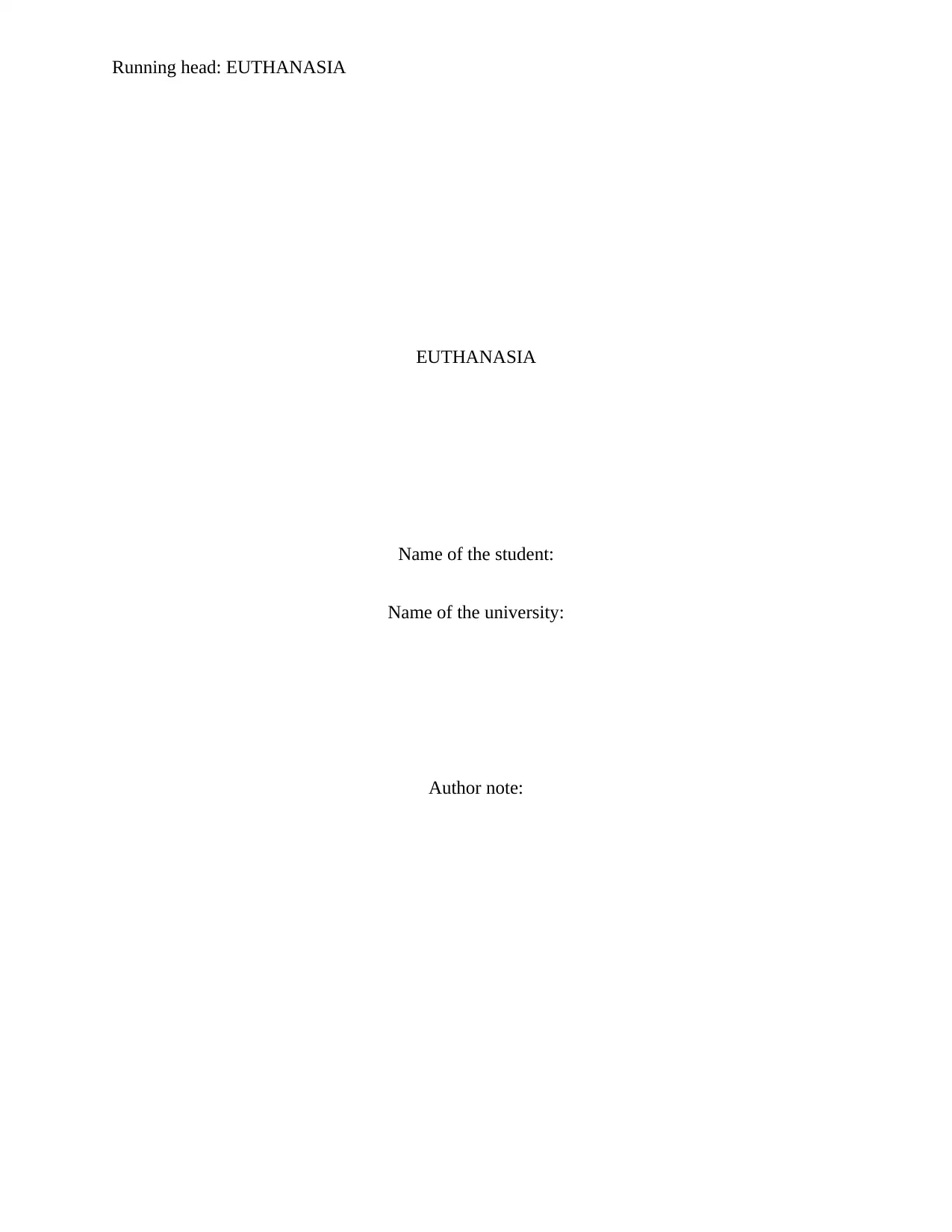
Running head: EUTHANASIA
EUTHANASIA
Name of the student:
Name of the university:
Author note:
EUTHANASIA
Name of the student:
Name of the university:
Author note:
Paraphrase This Document
Need a fresh take? Get an instant paraphrase of this document with our AI Paraphraser
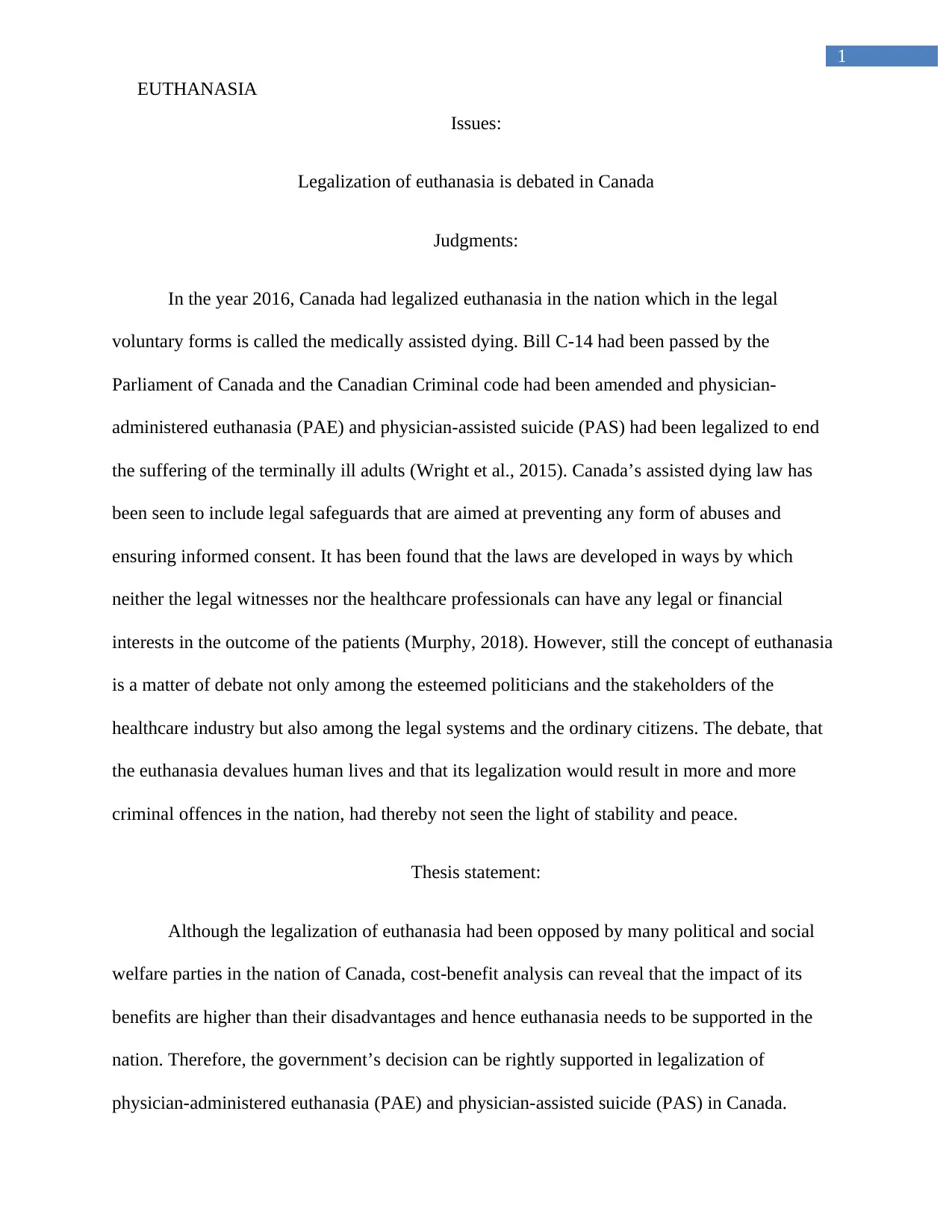
1
EUTHANASIA
Issues:
Legalization of euthanasia is debated in Canada
Judgments:
In the year 2016, Canada had legalized euthanasia in the nation which in the legal
voluntary forms is called the medically assisted dying. Bill C-14 had been passed by the
Parliament of Canada and the Canadian Criminal code had been amended and physician-
administered euthanasia (PAE) and physician-assisted suicide (PAS) had been legalized to end
the suffering of the terminally ill adults (Wright et al., 2015). Canada’s assisted dying law has
been seen to include legal safeguards that are aimed at preventing any form of abuses and
ensuring informed consent. It has been found that the laws are developed in ways by which
neither the legal witnesses nor the healthcare professionals can have any legal or financial
interests in the outcome of the patients (Murphy, 2018). However, still the concept of euthanasia
is a matter of debate not only among the esteemed politicians and the stakeholders of the
healthcare industry but also among the legal systems and the ordinary citizens. The debate, that
the euthanasia devalues human lives and that its legalization would result in more and more
criminal offences in the nation, had thereby not seen the light of stability and peace.
Thesis statement:
Although the legalization of euthanasia had been opposed by many political and social
welfare parties in the nation of Canada, cost-benefit analysis can reveal that the impact of its
benefits are higher than their disadvantages and hence euthanasia needs to be supported in the
nation. Therefore, the government’s decision can be rightly supported in legalization of
physician-administered euthanasia (PAE) and physician-assisted suicide (PAS) in Canada.
EUTHANASIA
Issues:
Legalization of euthanasia is debated in Canada
Judgments:
In the year 2016, Canada had legalized euthanasia in the nation which in the legal
voluntary forms is called the medically assisted dying. Bill C-14 had been passed by the
Parliament of Canada and the Canadian Criminal code had been amended and physician-
administered euthanasia (PAE) and physician-assisted suicide (PAS) had been legalized to end
the suffering of the terminally ill adults (Wright et al., 2015). Canada’s assisted dying law has
been seen to include legal safeguards that are aimed at preventing any form of abuses and
ensuring informed consent. It has been found that the laws are developed in ways by which
neither the legal witnesses nor the healthcare professionals can have any legal or financial
interests in the outcome of the patients (Murphy, 2018). However, still the concept of euthanasia
is a matter of debate not only among the esteemed politicians and the stakeholders of the
healthcare industry but also among the legal systems and the ordinary citizens. The debate, that
the euthanasia devalues human lives and that its legalization would result in more and more
criminal offences in the nation, had thereby not seen the light of stability and peace.
Thesis statement:
Although the legalization of euthanasia had been opposed by many political and social
welfare parties in the nation of Canada, cost-benefit analysis can reveal that the impact of its
benefits are higher than their disadvantages and hence euthanasia needs to be supported in the
nation. Therefore, the government’s decision can be rightly supported in legalization of
physician-administered euthanasia (PAE) and physician-assisted suicide (PAS) in Canada.
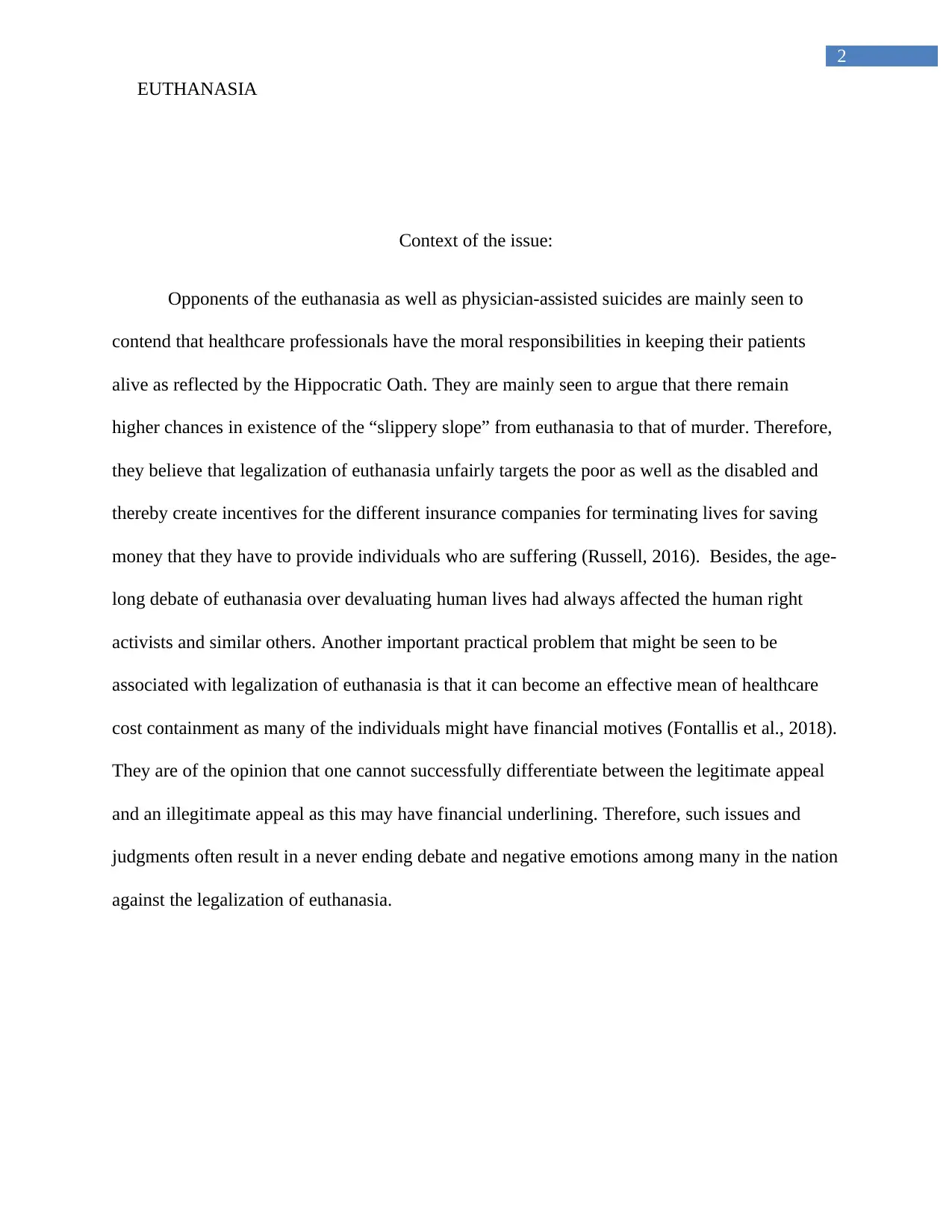
2
EUTHANASIA
Context of the issue:
Opponents of the euthanasia as well as physician-assisted suicides are mainly seen to
contend that healthcare professionals have the moral responsibilities in keeping their patients
alive as reflected by the Hippocratic Oath. They are mainly seen to argue that there remain
higher chances in existence of the “slippery slope” from euthanasia to that of murder. Therefore,
they believe that legalization of euthanasia unfairly targets the poor as well as the disabled and
thereby create incentives for the different insurance companies for terminating lives for saving
money that they have to provide individuals who are suffering (Russell, 2016). Besides, the age-
long debate of euthanasia over devaluating human lives had always affected the human right
activists and similar others. Another important practical problem that might be seen to be
associated with legalization of euthanasia is that it can become an effective mean of healthcare
cost containment as many of the individuals might have financial motives (Fontallis et al., 2018).
They are of the opinion that one cannot successfully differentiate between the legitimate appeal
and an illegitimate appeal as this may have financial underlining. Therefore, such issues and
judgments often result in a never ending debate and negative emotions among many in the nation
against the legalization of euthanasia.
EUTHANASIA
Context of the issue:
Opponents of the euthanasia as well as physician-assisted suicides are mainly seen to
contend that healthcare professionals have the moral responsibilities in keeping their patients
alive as reflected by the Hippocratic Oath. They are mainly seen to argue that there remain
higher chances in existence of the “slippery slope” from euthanasia to that of murder. Therefore,
they believe that legalization of euthanasia unfairly targets the poor as well as the disabled and
thereby create incentives for the different insurance companies for terminating lives for saving
money that they have to provide individuals who are suffering (Russell, 2016). Besides, the age-
long debate of euthanasia over devaluating human lives had always affected the human right
activists and similar others. Another important practical problem that might be seen to be
associated with legalization of euthanasia is that it can become an effective mean of healthcare
cost containment as many of the individuals might have financial motives (Fontallis et al., 2018).
They are of the opinion that one cannot successfully differentiate between the legitimate appeal
and an illegitimate appeal as this may have financial underlining. Therefore, such issues and
judgments often result in a never ending debate and negative emotions among many in the nation
against the legalization of euthanasia.
⊘ This is a preview!⊘
Do you want full access?
Subscribe today to unlock all pages.

Trusted by 1+ million students worldwide
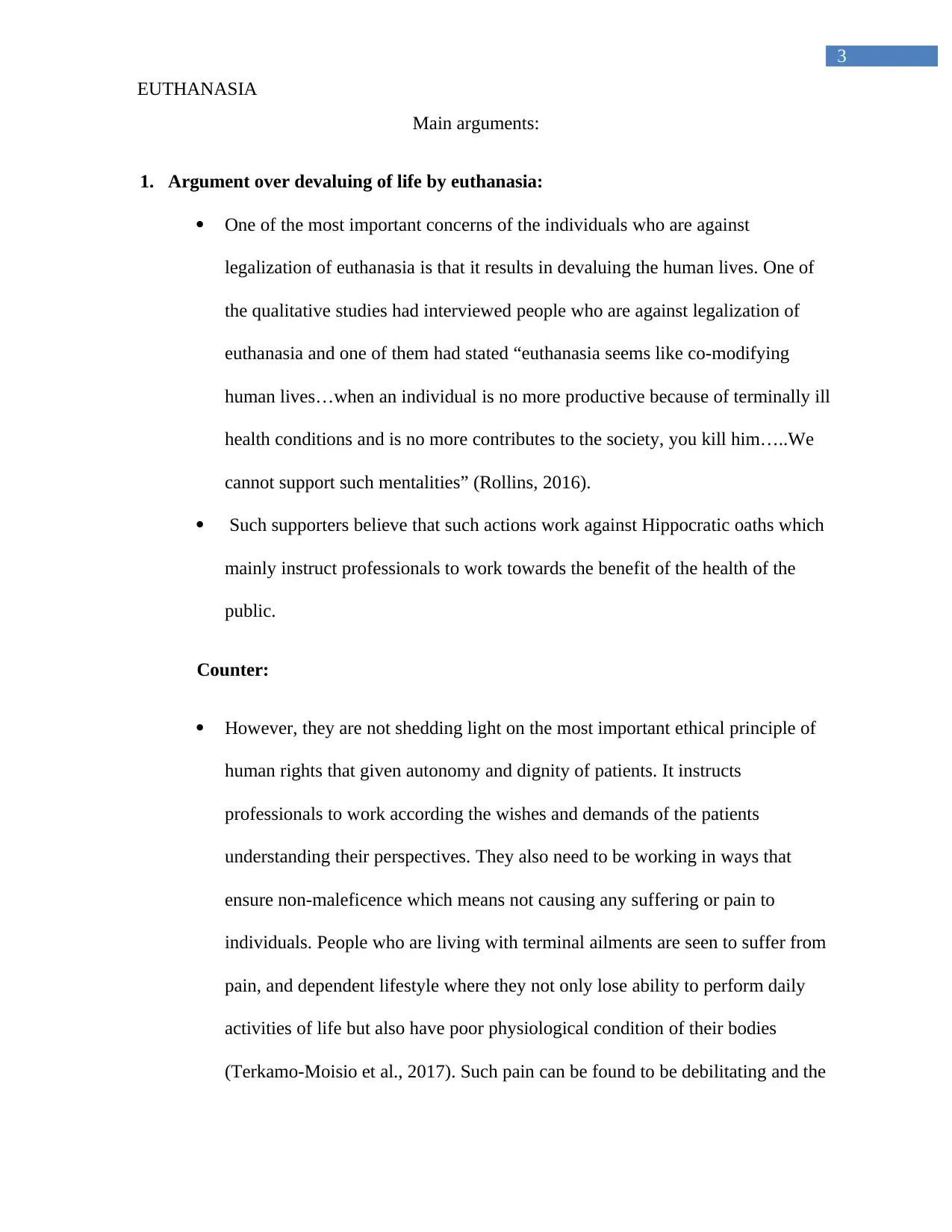
3
EUTHANASIA
Main arguments:
1. Argument over devaluing of life by euthanasia:
One of the most important concerns of the individuals who are against
legalization of euthanasia is that it results in devaluing the human lives. One of
the qualitative studies had interviewed people who are against legalization of
euthanasia and one of them had stated “euthanasia seems like co-modifying
human lives…when an individual is no more productive because of terminally ill
health conditions and is no more contributes to the society, you kill him…..We
cannot support such mentalities” (Rollins, 2016).
Such supporters believe that such actions work against Hippocratic oaths which
mainly instruct professionals to work towards the benefit of the health of the
public.
Counter:
However, they are not shedding light on the most important ethical principle of
human rights that given autonomy and dignity of patients. It instructs
professionals to work according the wishes and demands of the patients
understanding their perspectives. They also need to be working in ways that
ensure non-maleficence which means not causing any suffering or pain to
individuals. People who are living with terminal ailments are seen to suffer from
pain, and dependent lifestyle where they not only lose ability to perform daily
activities of life but also have poor physiological condition of their bodies
(Terkamo-Moisio et al., 2017). Such pain can be found to be debilitating and the
EUTHANASIA
Main arguments:
1. Argument over devaluing of life by euthanasia:
One of the most important concerns of the individuals who are against
legalization of euthanasia is that it results in devaluing the human lives. One of
the qualitative studies had interviewed people who are against legalization of
euthanasia and one of them had stated “euthanasia seems like co-modifying
human lives…when an individual is no more productive because of terminally ill
health conditions and is no more contributes to the society, you kill him…..We
cannot support such mentalities” (Rollins, 2016).
Such supporters believe that such actions work against Hippocratic oaths which
mainly instruct professionals to work towards the benefit of the health of the
public.
Counter:
However, they are not shedding light on the most important ethical principle of
human rights that given autonomy and dignity of patients. It instructs
professionals to work according the wishes and demands of the patients
understanding their perspectives. They also need to be working in ways that
ensure non-maleficence which means not causing any suffering or pain to
individuals. People who are living with terminal ailments are seen to suffer from
pain, and dependent lifestyle where they not only lose ability to perform daily
activities of life but also have poor physiological condition of their bodies
(Terkamo-Moisio et al., 2017). Such pain can be found to be debilitating and the
Paraphrase This Document
Need a fresh take? Get an instant paraphrase of this document with our AI Paraphraser
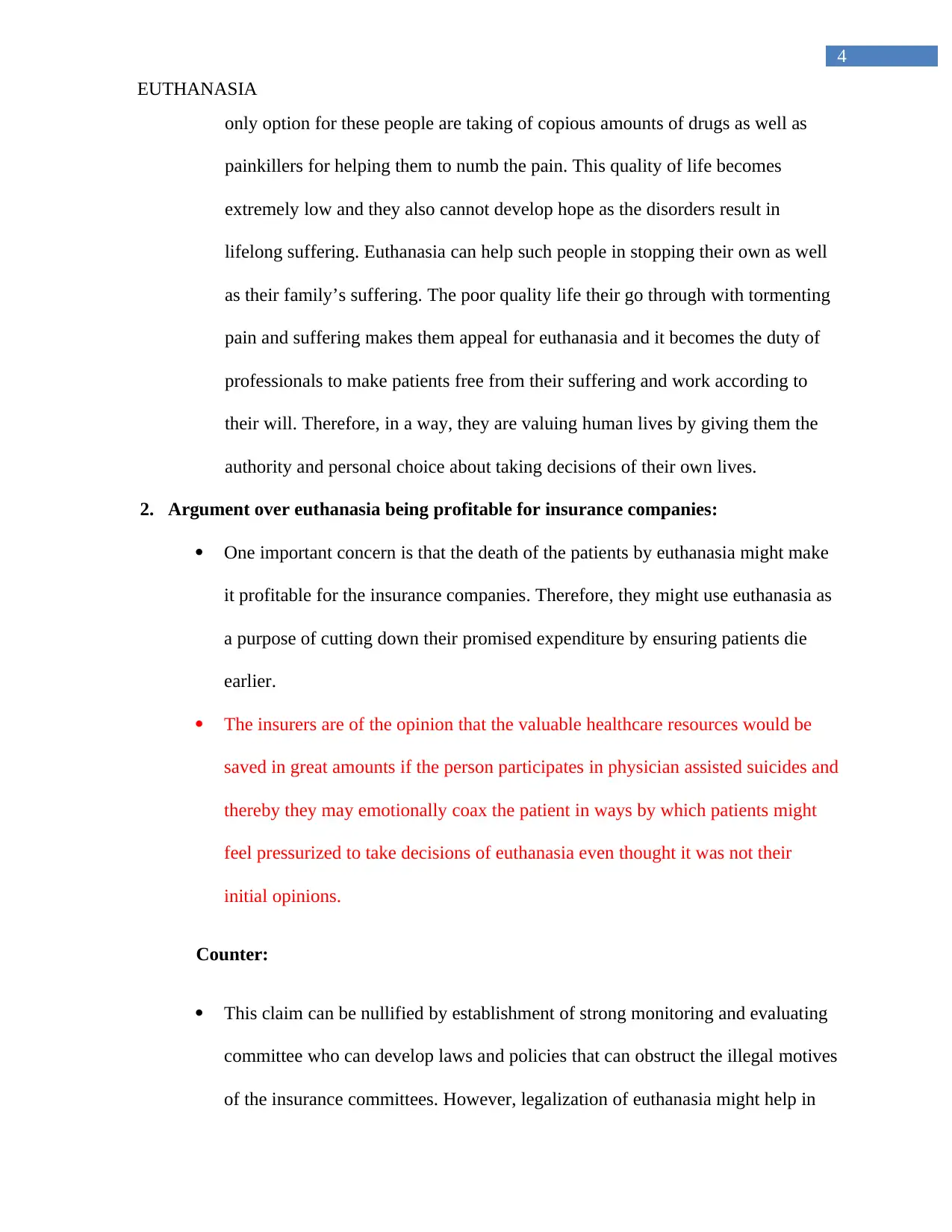
4
EUTHANASIA
only option for these people are taking of copious amounts of drugs as well as
painkillers for helping them to numb the pain. This quality of life becomes
extremely low and they also cannot develop hope as the disorders result in
lifelong suffering. Euthanasia can help such people in stopping their own as well
as their family’s suffering. The poor quality life their go through with tormenting
pain and suffering makes them appeal for euthanasia and it becomes the duty of
professionals to make patients free from their suffering and work according to
their will. Therefore, in a way, they are valuing human lives by giving them the
authority and personal choice about taking decisions of their own lives.
2. Argument over euthanasia being profitable for insurance companies:
One important concern is that the death of the patients by euthanasia might make
it profitable for the insurance companies. Therefore, they might use euthanasia as
a purpose of cutting down their promised expenditure by ensuring patients die
earlier.
The insurers are of the opinion that the valuable healthcare resources would be
saved in great amounts if the person participates in physician assisted suicides and
thereby they may emotionally coax the patient in ways by which patients might
feel pressurized to take decisions of euthanasia even thought it was not their
initial opinions.
Counter:
This claim can be nullified by establishment of strong monitoring and evaluating
committee who can develop laws and policies that can obstruct the illegal motives
of the insurance committees. However, legalization of euthanasia might help in
EUTHANASIA
only option for these people are taking of copious amounts of drugs as well as
painkillers for helping them to numb the pain. This quality of life becomes
extremely low and they also cannot develop hope as the disorders result in
lifelong suffering. Euthanasia can help such people in stopping their own as well
as their family’s suffering. The poor quality life their go through with tormenting
pain and suffering makes them appeal for euthanasia and it becomes the duty of
professionals to make patients free from their suffering and work according to
their will. Therefore, in a way, they are valuing human lives by giving them the
authority and personal choice about taking decisions of their own lives.
2. Argument over euthanasia being profitable for insurance companies:
One important concern is that the death of the patients by euthanasia might make
it profitable for the insurance companies. Therefore, they might use euthanasia as
a purpose of cutting down their promised expenditure by ensuring patients die
earlier.
The insurers are of the opinion that the valuable healthcare resources would be
saved in great amounts if the person participates in physician assisted suicides and
thereby they may emotionally coax the patient in ways by which patients might
feel pressurized to take decisions of euthanasia even thought it was not their
initial opinions.
Counter:
This claim can be nullified by establishment of strong monitoring and evaluating
committee who can develop laws and policies that can obstruct the illegal motives
of the insurance committees. However, legalization of euthanasia might help in
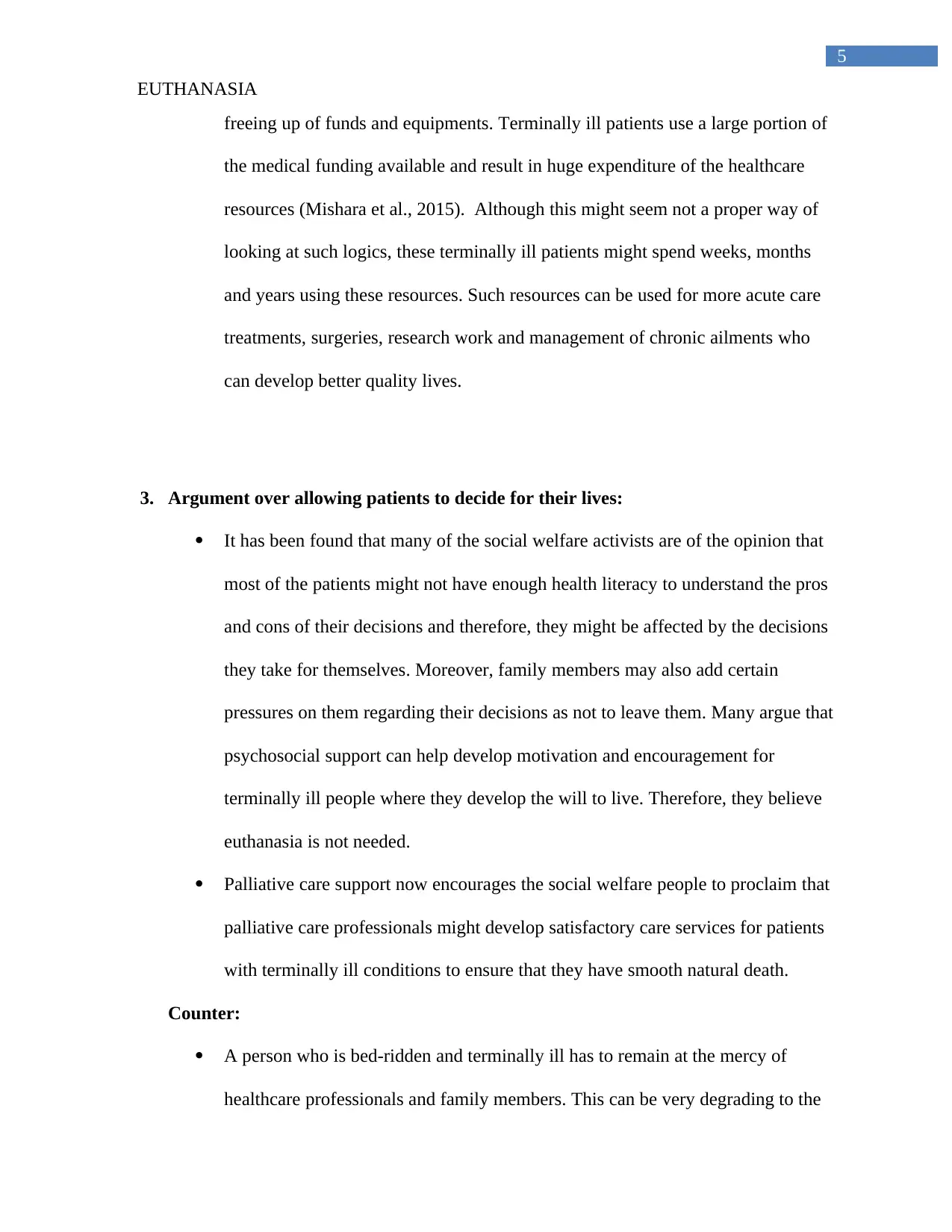
5
EUTHANASIA
freeing up of funds and equipments. Terminally ill patients use a large portion of
the medical funding available and result in huge expenditure of the healthcare
resources (Mishara et al., 2015). Although this might seem not a proper way of
looking at such logics, these terminally ill patients might spend weeks, months
and years using these resources. Such resources can be used for more acute care
treatments, surgeries, research work and management of chronic ailments who
can develop better quality lives.
3. Argument over allowing patients to decide for their lives:
It has been found that many of the social welfare activists are of the opinion that
most of the patients might not have enough health literacy to understand the pros
and cons of their decisions and therefore, they might be affected by the decisions
they take for themselves. Moreover, family members may also add certain
pressures on them regarding their decisions as not to leave them. Many argue that
psychosocial support can help develop motivation and encouragement for
terminally ill people where they develop the will to live. Therefore, they believe
euthanasia is not needed.
Palliative care support now encourages the social welfare people to proclaim that
palliative care professionals might develop satisfactory care services for patients
with terminally ill conditions to ensure that they have smooth natural death.
Counter:
A person who is bed-ridden and terminally ill has to remain at the mercy of
healthcare professionals and family members. This can be very degrading to the
EUTHANASIA
freeing up of funds and equipments. Terminally ill patients use a large portion of
the medical funding available and result in huge expenditure of the healthcare
resources (Mishara et al., 2015). Although this might seem not a proper way of
looking at such logics, these terminally ill patients might spend weeks, months
and years using these resources. Such resources can be used for more acute care
treatments, surgeries, research work and management of chronic ailments who
can develop better quality lives.
3. Argument over allowing patients to decide for their lives:
It has been found that many of the social welfare activists are of the opinion that
most of the patients might not have enough health literacy to understand the pros
and cons of their decisions and therefore, they might be affected by the decisions
they take for themselves. Moreover, family members may also add certain
pressures on them regarding their decisions as not to leave them. Many argue that
psychosocial support can help develop motivation and encouragement for
terminally ill people where they develop the will to live. Therefore, they believe
euthanasia is not needed.
Palliative care support now encourages the social welfare people to proclaim that
palliative care professionals might develop satisfactory care services for patients
with terminally ill conditions to ensure that they have smooth natural death.
Counter:
A person who is bed-ridden and terminally ill has to remain at the mercy of
healthcare professionals and family members. This can be very degrading to the
⊘ This is a preview!⊘
Do you want full access?
Subscribe today to unlock all pages.

Trusted by 1+ million students worldwide
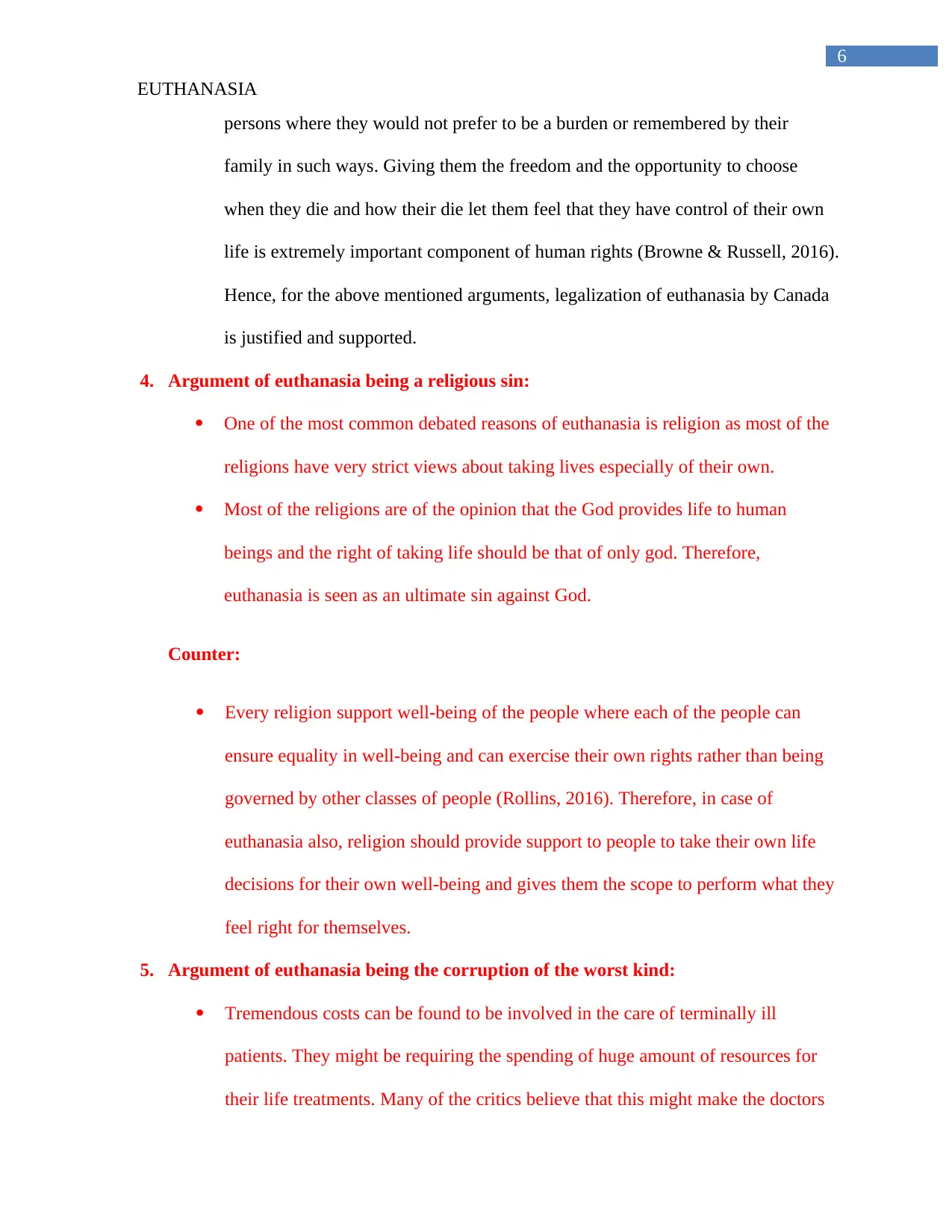
6
EUTHANASIA
persons where they would not prefer to be a burden or remembered by their
family in such ways. Giving them the freedom and the opportunity to choose
when they die and how their die let them feel that they have control of their own
life is extremely important component of human rights (Browne & Russell, 2016).
Hence, for the above mentioned arguments, legalization of euthanasia by Canada
is justified and supported.
4. Argument of euthanasia being a religious sin:
One of the most common debated reasons of euthanasia is religion as most of the
religions have very strict views about taking lives especially of their own.
Most of the religions are of the opinion that the God provides life to human
beings and the right of taking life should be that of only god. Therefore,
euthanasia is seen as an ultimate sin against God.
Counter:
Every religion support well-being of the people where each of the people can
ensure equality in well-being and can exercise their own rights rather than being
governed by other classes of people (Rollins, 2016). Therefore, in case of
euthanasia also, religion should provide support to people to take their own life
decisions for their own well-being and gives them the scope to perform what they
feel right for themselves.
5. Argument of euthanasia being the corruption of the worst kind:
Tremendous costs can be found to be involved in the care of terminally ill
patients. They might be requiring the spending of huge amount of resources for
their life treatments. Many of the critics believe that this might make the doctors
EUTHANASIA
persons where they would not prefer to be a burden or remembered by their
family in such ways. Giving them the freedom and the opportunity to choose
when they die and how their die let them feel that they have control of their own
life is extremely important component of human rights (Browne & Russell, 2016).
Hence, for the above mentioned arguments, legalization of euthanasia by Canada
is justified and supported.
4. Argument of euthanasia being a religious sin:
One of the most common debated reasons of euthanasia is religion as most of the
religions have very strict views about taking lives especially of their own.
Most of the religions are of the opinion that the God provides life to human
beings and the right of taking life should be that of only god. Therefore,
euthanasia is seen as an ultimate sin against God.
Counter:
Every religion support well-being of the people where each of the people can
ensure equality in well-being and can exercise their own rights rather than being
governed by other classes of people (Rollins, 2016). Therefore, in case of
euthanasia also, religion should provide support to people to take their own life
decisions for their own well-being and gives them the scope to perform what they
feel right for themselves.
5. Argument of euthanasia being the corruption of the worst kind:
Tremendous costs can be found to be involved in the care of terminally ill
patients. They might be requiring the spending of huge amount of resources for
their life treatments. Many of the critics believe that this might make the doctors
Paraphrase This Document
Need a fresh take? Get an instant paraphrase of this document with our AI Paraphraser
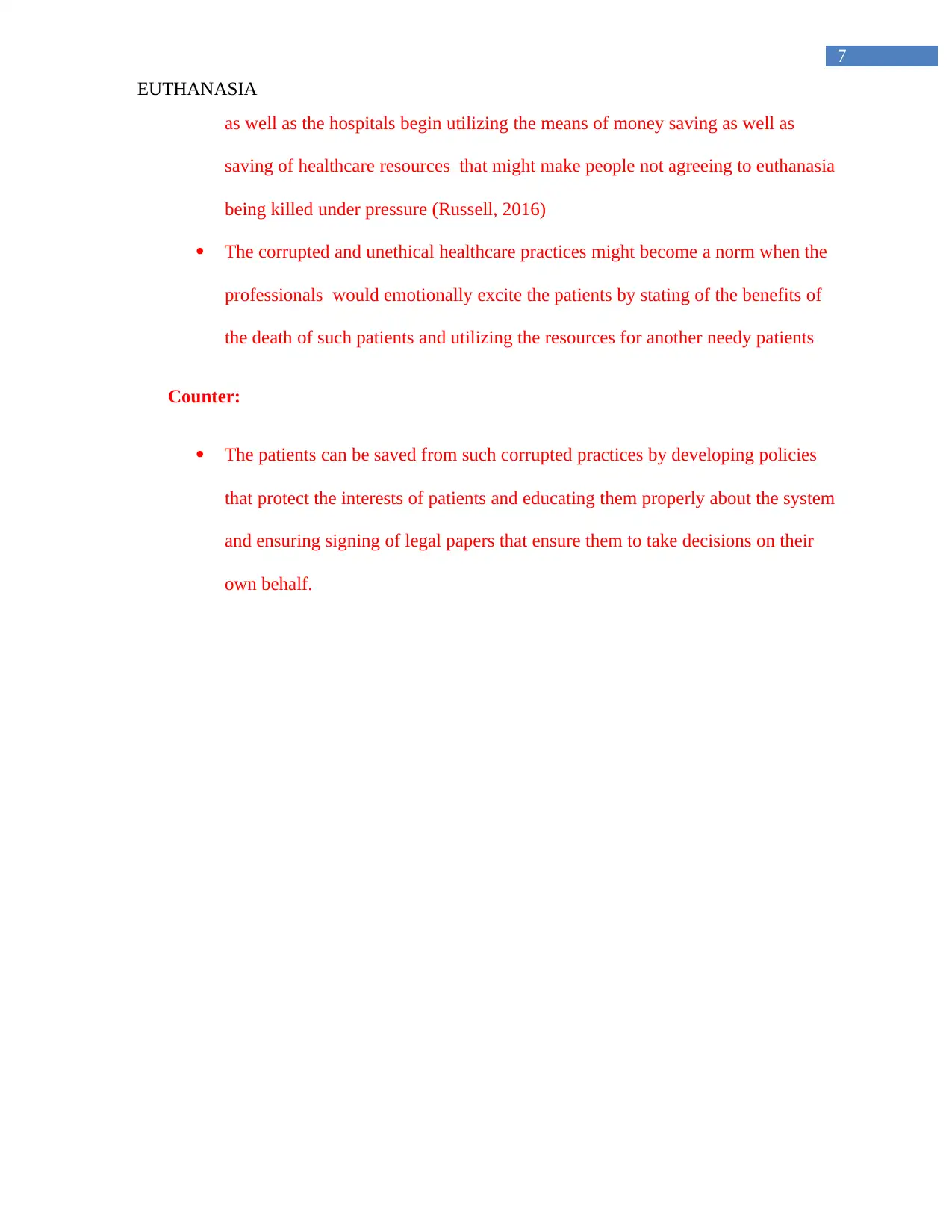
7
EUTHANASIA
as well as the hospitals begin utilizing the means of money saving as well as
saving of healthcare resources that might make people not agreeing to euthanasia
being killed under pressure (Russell, 2016)
The corrupted and unethical healthcare practices might become a norm when the
professionals would emotionally excite the patients by stating of the benefits of
the death of such patients and utilizing the resources for another needy patients
Counter:
The patients can be saved from such corrupted practices by developing policies
that protect the interests of patients and educating them properly about the system
and ensuring signing of legal papers that ensure them to take decisions on their
own behalf.
EUTHANASIA
as well as the hospitals begin utilizing the means of money saving as well as
saving of healthcare resources that might make people not agreeing to euthanasia
being killed under pressure (Russell, 2016)
The corrupted and unethical healthcare practices might become a norm when the
professionals would emotionally excite the patients by stating of the benefits of
the death of such patients and utilizing the resources for another needy patients
Counter:
The patients can be saved from such corrupted practices by developing policies
that protect the interests of patients and educating them properly about the system
and ensuring signing of legal papers that ensure them to take decisions on their
own behalf.
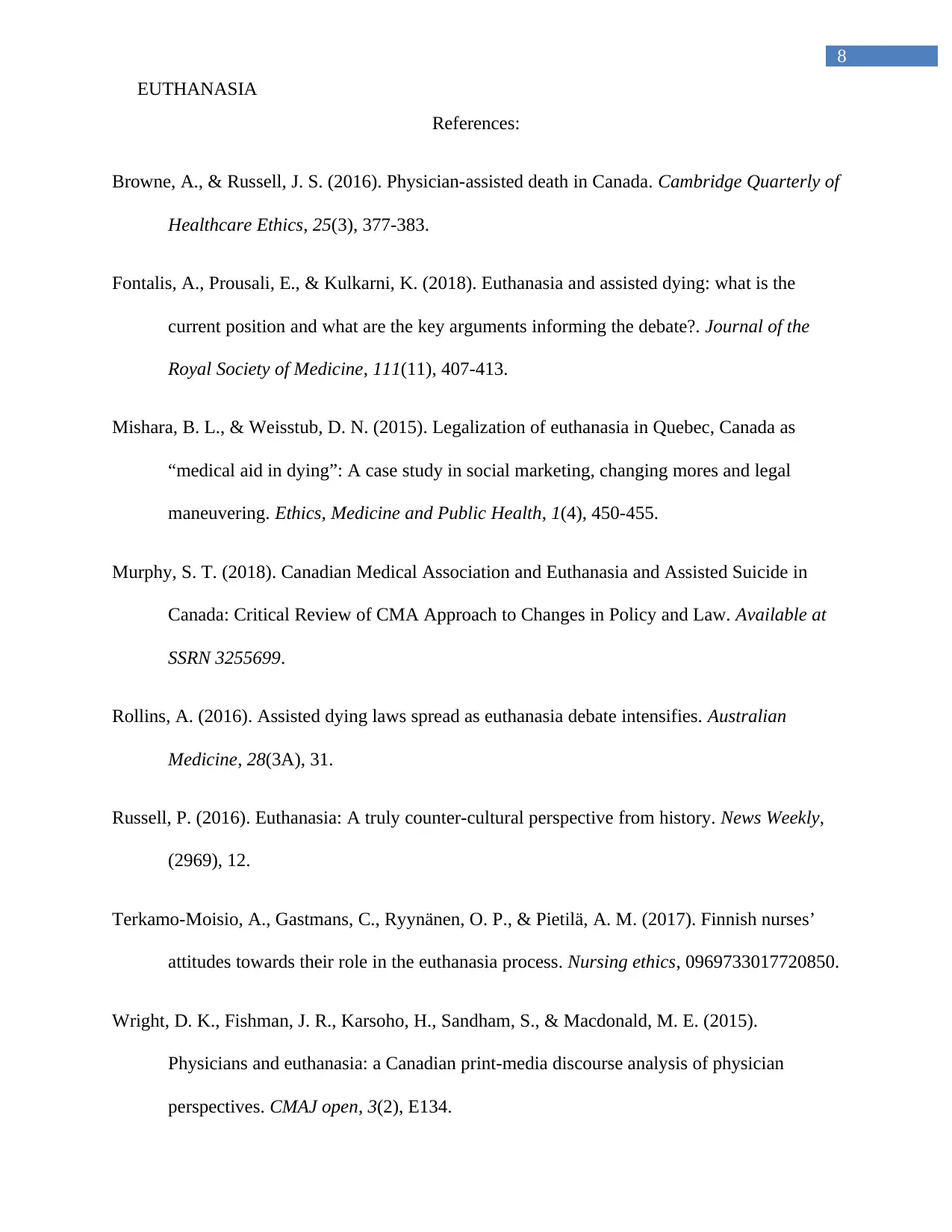
8
EUTHANASIA
References:
Browne, A., & Russell, J. S. (2016). Physician-assisted death in Canada. Cambridge Quarterly of
Healthcare Ethics, 25(3), 377-383.
Fontalis, A., Prousali, E., & Kulkarni, K. (2018). Euthanasia and assisted dying: what is the
current position and what are the key arguments informing the debate?. Journal of the
Royal Society of Medicine, 111(11), 407-413.
Mishara, B. L., & Weisstub, D. N. (2015). Legalization of euthanasia in Quebec, Canada as
“medical aid in dying”: A case study in social marketing, changing mores and legal
maneuvering. Ethics, Medicine and Public Health, 1(4), 450-455.
Murphy, S. T. (2018). Canadian Medical Association and Euthanasia and Assisted Suicide in
Canada: Critical Review of CMA Approach to Changes in Policy and Law. Available at
SSRN 3255699.
Rollins, A. (2016). Assisted dying laws spread as euthanasia debate intensifies. Australian
Medicine, 28(3A), 31.
Russell, P. (2016). Euthanasia: A truly counter-cultural perspective from history. News Weekly,
(2969), 12.
Terkamo-Moisio, A., Gastmans, C., Ryynänen, O. P., & Pietilä, A. M. (2017). Finnish nurses’
attitudes towards their role in the euthanasia process. Nursing ethics, 0969733017720850.
Wright, D. K., Fishman, J. R., Karsoho, H., Sandham, S., & Macdonald, M. E. (2015).
Physicians and euthanasia: a Canadian print-media discourse analysis of physician
perspectives. CMAJ open, 3(2), E134.
EUTHANASIA
References:
Browne, A., & Russell, J. S. (2016). Physician-assisted death in Canada. Cambridge Quarterly of
Healthcare Ethics, 25(3), 377-383.
Fontalis, A., Prousali, E., & Kulkarni, K. (2018). Euthanasia and assisted dying: what is the
current position and what are the key arguments informing the debate?. Journal of the
Royal Society of Medicine, 111(11), 407-413.
Mishara, B. L., & Weisstub, D. N. (2015). Legalization of euthanasia in Quebec, Canada as
“medical aid in dying”: A case study in social marketing, changing mores and legal
maneuvering. Ethics, Medicine and Public Health, 1(4), 450-455.
Murphy, S. T. (2018). Canadian Medical Association and Euthanasia and Assisted Suicide in
Canada: Critical Review of CMA Approach to Changes in Policy and Law. Available at
SSRN 3255699.
Rollins, A. (2016). Assisted dying laws spread as euthanasia debate intensifies. Australian
Medicine, 28(3A), 31.
Russell, P. (2016). Euthanasia: A truly counter-cultural perspective from history. News Weekly,
(2969), 12.
Terkamo-Moisio, A., Gastmans, C., Ryynänen, O. P., & Pietilä, A. M. (2017). Finnish nurses’
attitudes towards their role in the euthanasia process. Nursing ethics, 0969733017720850.
Wright, D. K., Fishman, J. R., Karsoho, H., Sandham, S., & Macdonald, M. E. (2015).
Physicians and euthanasia: a Canadian print-media discourse analysis of physician
perspectives. CMAJ open, 3(2), E134.
⊘ This is a preview!⊘
Do you want full access?
Subscribe today to unlock all pages.

Trusted by 1+ million students worldwide

9
EUTHANASIA
EUTHANASIA
1 out of 10
Related Documents
Your All-in-One AI-Powered Toolkit for Academic Success.
+13062052269
info@desklib.com
Available 24*7 on WhatsApp / Email
![[object Object]](/_next/static/media/star-bottom.7253800d.svg)
Unlock your academic potential
Copyright © 2020–2026 A2Z Services. All Rights Reserved. Developed and managed by ZUCOL.




